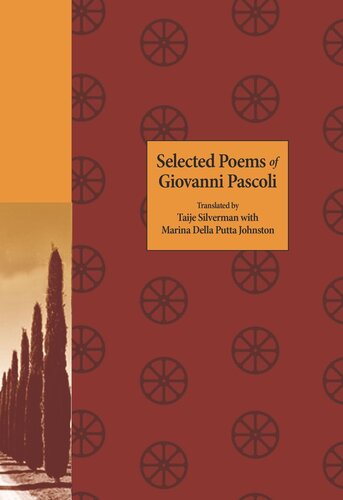

Most ebook files are in PDF format, so you can easily read them using various software such as Foxit Reader or directly on the Google Chrome browser.
Some ebook files are released by publishers in other formats such as .awz, .mobi, .epub, .fb2, etc. You may need to install specific software to read these formats on mobile/PC, such as Calibre.
Please read the tutorial at this link: https://ebookbell.com/faq
We offer FREE conversion to the popular formats you request; however, this may take some time. Therefore, right after payment, please email us, and we will try to provide the service as quickly as possible.
For some exceptional file formats or broken links (if any), please refrain from opening any disputes. Instead, email us first, and we will try to assist within a maximum of 6 hours.
EbookBell Team

4.3
98 reviewsSelected for the Lockert Library of Poetry in Translation, a major new translation of poems by the influential nineteenth-century Italian poet Giovanni Pascoli (1855-1912).
Note: This is a simultaneous release. Cloth edition: $55.00
The most comprehensive collection in English of the founder of modern Italian poetry
Giovanni Pascoli (1855–1912)—the founder of modern Italian poetry and one of Italy's most beloved poets—has been compared to Robert Frost for his evocation of natural speech, his bucolic settings, and the way he bridges poetic tradition and the beginnings of modernism. Featuring verse from throughout his career, and with the original Italian on facing pages, Selected Poems of Giovanni Pascoli is a comprehensive and authoritative collection of a fascinating and major literary figure.
Reading this poet of nature, grief, and small-town life is like traveling through Italy's landscapes in his footsteps—from Romagna and Bologna to Rome, Sicily, and Tuscany—as the country transformed from an agrarian society into an industrial one. Mixing the elevated diction of Virgil with local slang and the sounds of the natural world, these poems capture sense-laden moments: a train's departure, a wren's winter foraging, and the lit windows of a town at dusk. Incorporating revolutionary language into classical scenes, Pascoli's poems describe ancient rural dramas—both large and small—that remain contemporary.
Framed by an introduction, annotations, and a substantial chronology, Taije Silverman and Marina Della Putta Johnston's translations render the variety, precision, and beauty of Pascoli's poetry with a profoundly current vision.